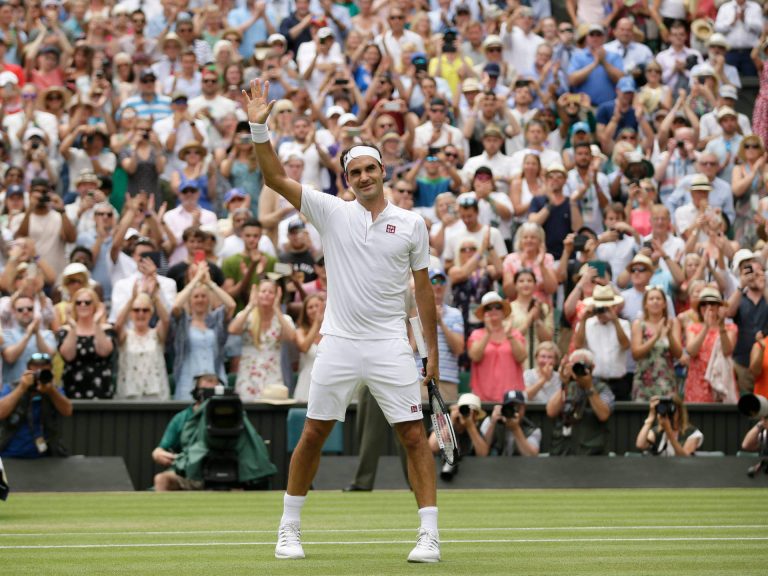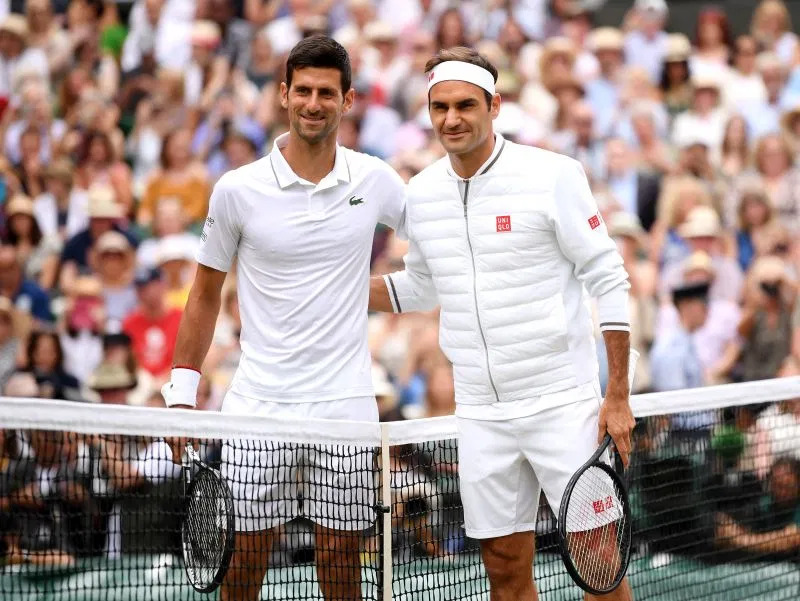Tennis fans all around the world flock to stadiums to cheer on their favorite players, and there’s no denying that Roger Federer has long been the crowd favorite. His grace on the court, his sportsmanship, and his friendly personality have earned him adoration from fans worldwide. On the other hand, Novak Djokovic, one of the greatest tennis players of all time, seems to receive a more mixed response from the crowds, despite his impressive achievements.
So, why doesn’t Djokovic get the same level of fan support and cheers that Federer does? Is it just a matter of style and personality, or is there more to the story? In this article, we’ll explore some of the reasons why Djokovic doesn’t always get the same enthusiastic applause as Federer, despite both being legends of the sport.
1. Federer’s Charisma and “Universal Appeal”
A Style of Play That’s Easy to Admire
One of the biggest reasons why Federer gets so much love from fans is his playing style. Federer’s game is often described as “effortless” and “elegant.” His smooth, graceful strokes and his ability to make even the most difficult shots look easy have captured the hearts of tennis fans around the world. Watching Federer play is like watching a master perform a ballet—everything flows perfectly, and it’s a visual delight.
This aesthetic quality of Federer’s game has made him universally loved, even by casual fans who may not follow tennis closely. His artistry on the court has earned him a place in the hearts of fans of all ages, backgrounds, and nationalities.
Charming Personality
Off the court, Federer is also known for his charming personality. He has a reputation for being polite, respectful, and humble. Federer’s graciousness in interviews, his connection with fans, and his image as a friendly ambassador for the sport have helped him build a massive global fanbase. Many fans admire his demeanor both on and off the court, which makes it easy for them to cheer for him.
2. Djokovic’s Controversies and Strong Opinions
A Strong Personality That Divides Fans
While Djokovic is undoubtedly one of the best players in tennis history, his personality sometimes divides opinions. Djokovic is known for being outspoken and passionate about his views, especially when it comes to topics like player rights, schedules, and health. While these opinions often come from a place of wanting to improve the sport, they can sometimes come across as controversial or polarizing to fans.
Some of Djokovic’s public statements, especially earlier in his career, made him appear as arrogant or self-centered to some fans. He has had moments where his confidence and determination were interpreted as overconfidence or even disrespectful, particularly when he had disagreements with other players or officials.
The “Villain” Role in Rivalries
Djokovic’s intense rivalry with Federer and Rafael Nadal has also contributed to his perception as the “villain” in some circles. Tennis fans often gravitate toward one of the three top players, and many tend to support either Federer or Nadal due to their unique qualities, with Djokovic seen as the “third wheel” in this iconic rivalry.
The media sometimes presents Djokovic as the “bad guy” because of his competitive nature, which contrasts with Federer’s calm demeanor and Nadal’s fighting spirit. This dynamic, combined with Djokovic’s occasional confrontations with the crowd or officials, has led to some fans viewing him as less approachable or more “difficult” than the other two.
3. The “Federer Effect” and the Impact of Timing
Federer’s Longevity and Perfect Timing
Federer’s journey to greatness wasn’t just about his talent—it also had a lot to do with timing. Federer reached the peak of his career during the early 2000s, at a time when tennis was growing globally. He became a household name and helped expand tennis’ reach to a larger audience, including casual fans who may not have watched the sport before. Federer’s dominance and elegance coincided with a boom in tennis popularity.
As a result, Federer built a large fanbase over time, with fans following him through various stages of his career, from his early struggles to his rise as the game’s biggest star. Federer has become synonymous with tennis for many fans, which means his cheers are often louder because people have been cheering for him for years.
Djokovic’s Rise Came Later
On the other hand, Djokovic’s rise to prominence came after Federer’s peak, and he didn’t have quite the same timing. Djokovic was often seen as a “challenger” to Federer and Nadal, especially in the early part of his career, and he wasn’t initially embraced by fans who were already loyal to Federer or Nadal. It took Djokovic longer to win over some fans, and while he has earned his share of admiration and respect, it’s been a gradual process.
Additionally, Djokovic’s dominance came during a period when the sport had already become more divided. Instead of being a clear hero or villain, Djokovic was often seen as the “third man” in a rivalry between two of tennis’ greatest players—Federer and Nadal. This made it harder for fans to fully rally behind him as they did with Federer.
4. Djokovic’s Unconventional Approach to Fans and the Media
Unpredictable Behavior with Fans
While Federer’s interactions with fans are often warm and engaging, Djokovic can sometimes appear more reserved or intense in his interactions. His occasional outbursts on the court, whether toward the umpires or the crowd, have sometimes put a damper on his relationship with the fans.
It’s not that Djokovic doesn’t appreciate his supporters; it’s just that his style of dealing with the media, his fans, and even the game itself can be more unpredictable. These moments might create a disconnect between him and the fans who admire Federer’s more relaxed, friendly attitude.
5. Conclusion: Djokovic’s Legacy Will Evolve
Despite the challenges Djokovic faces in gaining the same universal cheers as Roger Federer, his legacy as one of the greatest players in tennis history is secure. Djokovic’s achievements on the court—winning multiple Grand Slam titles, breaking records, and becoming one of the sport’s most consistent competitors—cannot be denied.
Over time, as the next generation of tennis fans emerges, Djokovic’s legacy may shift. As he continues to dominate and inspire future players, his image could evolve, and the cheers from the crowd may become even louder.
For now, while Federer may hold the crown for fan popularity, Djokovic’s place in tennis history is undeniable, and his impact on the sport will continue to be felt for years to come.
Do you think Novak Djokovic deserves more fan support and recognition? Or do you prefer the charismatic Federer and his approach to the game? Let us know your thoughts in the comments below!



